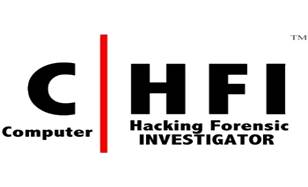
- Computer Forensics in Today’s World
- Computer Forensics Investigation Process
- Understanding Hard Disks and File Systems
- Operating System Forensics
- Defeating Anti-Forensics Techniques
- Data Acquisition and Duplication
- Network Forensics
- Investigating Web Attacks
- Database Forensics
- Cloud Forensics
- Malware Forensics
- Investigating Email Crimes
- Mobile Forensics
- Investigative Reports
This course is intended for law enforcement personnel, system administrators, security officers, defense and military personnel, legal professionals, bankers, computer and network security professionals, and anyone who is concerned about the integrity of the network and digital investigations.
Prior to attending this course, students must have completed the Certified Ethical Hacker (CEH) course or currently hold the CEHv8 or CEHv9 certification. Documentation is required prior to confirming registration.
This course is restricted to students at least 18 years old.
If the student is under the age of 18, they can attend if they provide a written consent of their parent/legal guardian and a supporting letter from their institution of higher learning. Only students from nationally accredited institutions of higher learning shall be considered.
After completing this course, students will be able to:
- Implement the process of investigating cybercrime, laws involved, and the details in obtaining and executing a search warrant.
- Identify different types of digital evidence, rules of evidence, digital evidence examination process, and electronic crime and digital evidence consideration by crime category.
- Assume the role of first responder to IT security incidents. This includes building and using the first responder toolkit, securing and evaluating electronic crime scene, conducting preliminary interviews, documenting electronic crime scene, collecting and preserving electronic evidence, packaging and transporting electronic evidence and reporting the crime scene.
- Recover deleted files and deleted partitions in Windows, Mac OS X, and Linux.
- Recover deleted email, images, documents, and other files containing relevant evidence.
- Conduct a forensic investigation using Access Data FTK and Encase.
- Identify the use of steganography and its techniques, and conduct steganalysis.
- Analyze image files for forensic data.
- Use password cracking tools and various types of password attacks to investigate password protected file breaches.
- Identify different types of log capturing techniques, log management, time synchronization and log capturing tools.
- Investigate logs, network traffic, wireless attacks, and web attacks.
